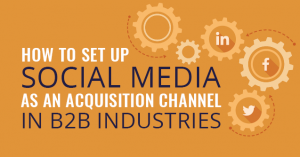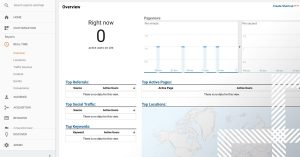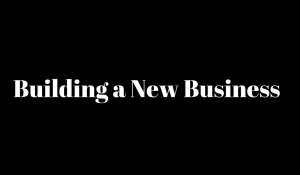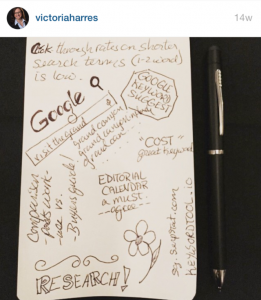
Planning out a video strategy?
Then you know that there are six words that always stand out from the rest:
Create content that people will love.
Engaging, interesting and targeted content is something that must be present at every stage of your buyer’s journey – the research process your potential customers go through before making a purchase, or committing to your brand.
When planning your buyer’s journey, you should be speaking the language of inbound marketing. This approach is all about creating specialized, tailored content that will attract prospects to you, rather than having your marketing efforts fight for their attention.
You’ve got to create content that engages people, and one of the most engaging types of content out there is, of course, video.
Why “of course”? Because, according to Forrester Research, just one minute of video content is worth more than 1.8 million words. It may sound incredible, but nobody can deny that video is a really powerful marketing tool.
Oftentimes people suggest that the future of online marketing is video, but the future is already here – video marketing is the present. So the question today is not whether or not you should be using video in your strategy, but rather how you should be using it.

The thing about video is that it doesn’t come in a one-size-fits-all package, but this is definitely not a bad thing! You can use it to your benefit, because it makes you focus on specializing content for every stage of your buyer’s journey.
The buyer’s journey has three important stages, and you need to craft content that will fit the specific needs of our customers in every one of these stages. This is when different types of video content come into play!
The Three Stages of the Buyer’s Journey
1. Awareness Stage
In the very first stage of the buyer’s journey, first impressions are everything.
Your customer’s first impression of your brand can appear to them in the form of a Google search, an ad on social media, a recommendation from a friend, a YouTube video, and a long list of etceteras. They have questions in need of answers, problems that need to be solved, and you have come to help with that.
The awareness stage is the time to make a powerful entrance, and you can do this by catching their attention with the right type of video.
What types of video can be used?
How-to videos
An educational or “how-to” video has a clear goal – to be helpful and easily shareable.
This is a great opportunity to create fun and helpful videos that answer the questions your prospects are searching for, easily addressing your customers’ needs.
Branded videos
On the other side of the spectrum there are branded videos, which are mostly about entertainment. When using branded videos, you’re creating content that’s fresh and fun, focused on being useful, interesting and viral, but also giving your audience an idea of the spirit of your brand.
When making branded videos, be creative. If you have fun making them, then your potential customers will have fun watching them, and they’ll be craving more.
Pro Tip: High-quality, short videos are the most effective videos to attract and hook your audience.
Look at this great example from IKEA.
IKEA (2014)
2. Consideration Stage
How will you be improving your customers’ lives? In this stage you let them see how they can integrate your product into their lives, and how it can make their lives easier.
The consideration stage involves taking your customers to the next level, introducing more product information and resolving any issues that would stop them from getting to stage three.
Why is your brand the best? Why is it better than the others? To answer these questions, one of the best ways to do it is by using explainer videos.
Explainer videos
Explainer Videos typically consist of detailed information defining a product, service or brand in under 2 minutes or less. It’s an amazing resource to guide your customers to take the next step in the journey. This is because you can use it to generate visibility, attract visitors to your site, convert them into leads, and finally, convert leads into customers.
A standard explainer video usually highlights a problem, followed by a solution, how this solution works, and a call to action. It’s also very important, as always, to make your videos interesting. This will grab and retain your customer’s attention.
With an animated video you can make your prospects aware of the problem they have, and you can present your product as the perfect solution to help them out in an informative and entertaining way.
Let me show you an example:
Animated video production for “Beezer” by Yum Yum Videos, 2016
3. Decision Stage
The last part of the buyer’s journey is the decision stage. Now that your prospect is familiar with your brand, they are now interested in you and it’s time to make a decision.
Are they going to make the right choice?
Video testimonials
A great way to give them a little push in the right direction (which is, of course, buying your product or getting your service), is with video testimonials.
Why? Because customers trust their peers more than anyone else. This is the moment to ensure your audience that they can trust you, and testimonial videos are a perfect way to guarantee that your customers are going to choose you.
Use customer testimonials, case studies and other third party endorsements. Similar to testimonials, you can use customer stories, a more objective third-person look at how someone has been helped by your product.
Check out this one from Google Chrome:
Behind-the-scenes videos
Behind-the-scenes videos show a side of your brand that is often forgotten. Get the people that are responsible for the magic in front of the camera, and this will give you a friendly feel that will make you connect with your potential customers easily.
Similar to this kind of content, you can also create “About Us” videos and in-depth videos that show the process of your product. All of this will help you bring your brand to life.
But of course, when your customers are at the final stage of the journey, it doesn’t mean that you will forget about them! When they have reached the finish line, it’s time to keep them satisfied and excited about the future of your products and company.
Keep them happy and up-to-date, and they will always be reminded of why they came to you in the first place.
Digital & Social Articles on Business 2 Community(53)








